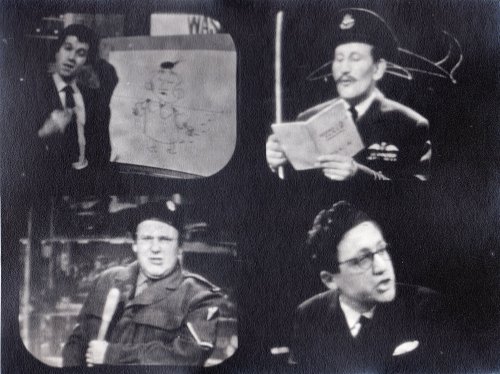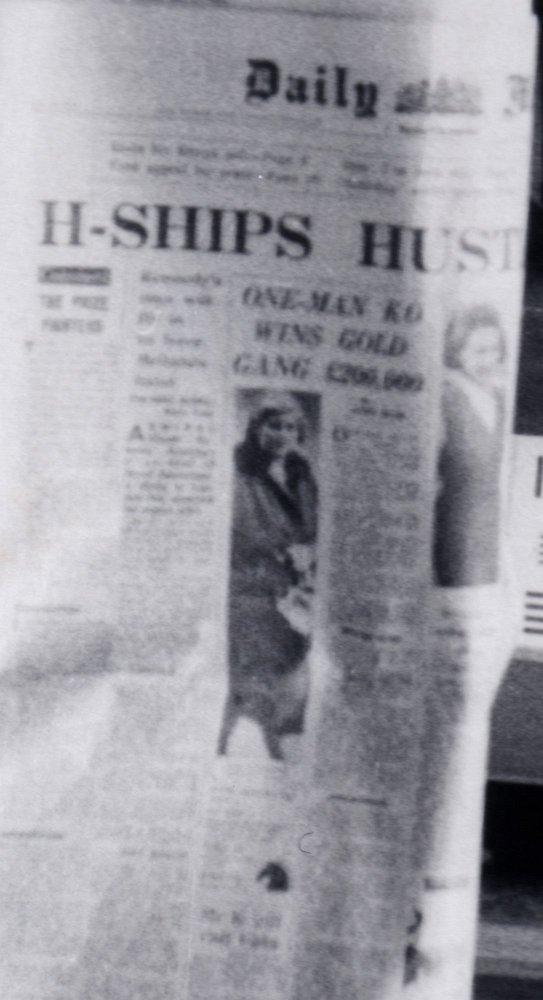Selected Reviews by Subject:- Movies, media, media critics | 'Holocaust' | Jews, Christians, Moslems | Race | Revisionism | Women | Bertrand Russell | Richard Dawkins | Martin Gardner
BELOW: My 2011 review which was after Internet began, but before much of modern revisionism ...
... & FURTHER BELOW: 2020: My thoroughly revised view of Moorehead on Russell: massage by Jew censorship.
Review of Bertrand Russell biography Caroline Moorehead: Bertrand Russell: A Life Vacant—interesting mainly for scandal, and Russell's last years, July 8, 2011 Vacant—interesting mainly for scandal, and Russell's last years, July 8, 2011
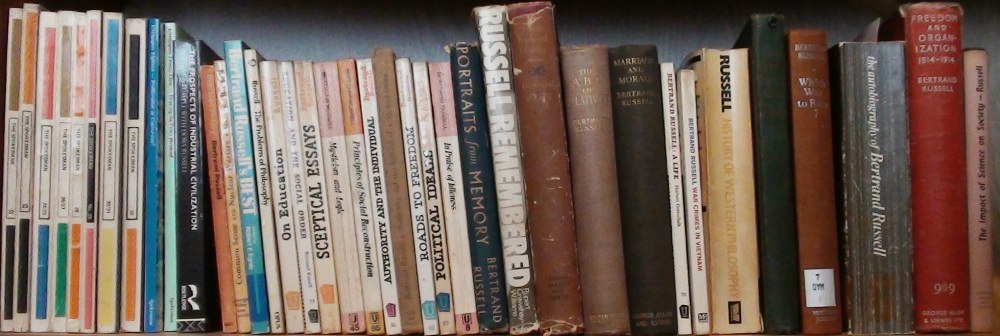 The interest of this book is in some side-issues, notably Russell's closing years, when of course he was extremely old. There's some information on his Committee of 100/CND activities, and on his War Crimes Tribunal, though not much, with many sideswipes at Ralph Schoenman. Occasional bits of information surface: for example, Americans students it seems talk of 'Occam's eraser'. Moorehead gives an account of Which Way to Peace? which Russell self-censored from his post-1945 writings. I hadn't known the unpleasant New York Times piece on Russell was written by Bernard Levin. I hadn't known Schoenman was a Hungarian Jew. There's an amusing piece of mischief—Russell listed (in 'Dear Bertrand Russell'—not mentioned at all by Moorehead) his favourite words, including wind, heath, begrime, and multisyllabic words—alembic, chrysoprase, Chorasmian. Moorehead has 'health' in place of 'heath', but more seriously someone inserted 'asholala' into Russell's list. |
| Rereview of A 'Definitive' Biography of Bertrand Russell. Caroline Moorehead: Bertrand Russell: A Life REPUTATION MANAGEMENT: THE LONG ARM OF JEWS. And: RECONSIDERING RUSSELL AND HIS PLACE IN THE WORLD. 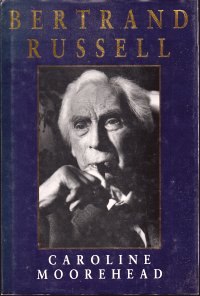
 Kendrick Mews, London SW7. South Kensington is a congested part of London, marked by museums, Cromwell Road, expensive shops, and traffic; including travellers by underground. With agents, reps, lawyers, renters, salesmen, collectors, managers, dealers, planners, liars. The copyright message (1992, by Caroline Moorehead) starts this journey: First published in Great Britain by Sinclair-Stevenson, 7/8 Kendrick Mews. This seems to have been founded by Christopher Sinclair-Stevenson, born in 1939 and author of a few romantic historical novels, it appears. 'Sinclair' is a Jewish red flag. His wife appears to be, or have been, Deborah, her surname unhyphenated. Random House seems to have bought them. Many an agent, editor, reader, literary agent, has followed this sort of path. At that time, computers and publishing had intermeshed in the script input and proof preparation sense, most obviously perhaps in the press and news. Caroline Moorehead (b 1944) has a jacket photo credited, for some reason, to Newnham College; there seems to be no connection. She is stated (in 1992) to write a column for the Independent on 'human rights'. I'd forgotten this was invented as long ago as 1986. However it was clearly founded as part of the push for 9/11 and Jewish wars, with mostly US thugs, and US money purveyed by Jews, against Middle East targets. It's painfully obvious she has no genuine interest in 'human rights'.
The Jewish-controlled network of Google, Amazon, Microsoft, Facebook and all the rest of it reports that Moorehead's biography is ‘definitive’ which of course it isn't. This is another of many clues that Bertrand Russell is a displacement, removing serious comments on and by Russell, much as Jews plan to displace whites. Moorehead has no competence to assess any aspect of Russell, apart from feminine gossip and rivalry. Russell's letters have been mined for their mixture of oratorical skill with sex, and incidentally can be irritating—Russell often praised wild places despite his complete lack of practical skills and one is sometimes tempted to wish a mischievous sprite had dumped him in, say, the Andes or Karakorum.
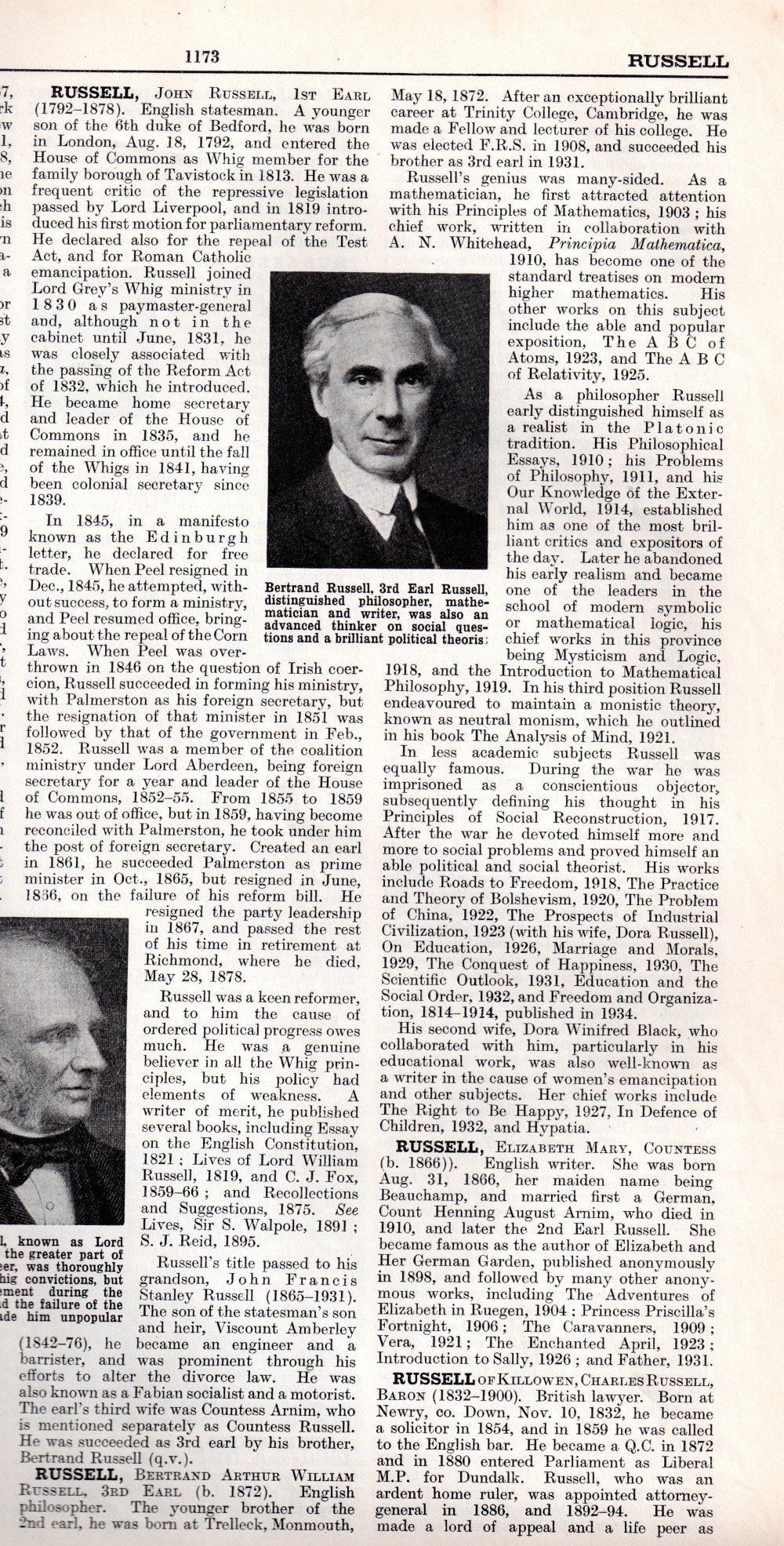 From a 1934 partwork 'Concise Universal Biography'. Russell received plenty of uncritical media adulation. Unless he wandered into Jewish territory, which only happened late in his life. From a 1934 partwork 'Concise Universal Biography'. Russell received plenty of uncritical media adulation. Unless he wandered into Jewish territory, which only happened late in his life.
Aristocracies are much less studied than they were; not many people, except perhaps Miles Mathis, thrill to the pages of Debrett's, and the lines of descent from Russells and Stanleys are barely mentioned in most biographies, including Russell's own. But it should be mentioned that part of the long process of Jewish intrusion involved promotions of people for purely Jewish political reasons. This piece Bertrand Russell duped by Jews and physicists tries to cover this ground, which as regards Bertrand himself (3rd Earl Russell) depends on Lord John Russell, Queen Victoria, and the Test Act, permitting Jews various legal concessions. I think this explains some of the oddities of Russell's family, such as their isolation. For example, Pembroke Lodge (in Richmond Park) was 'in the gift of the monarch'; Bertrand had relatives, such as Lord Portal, later something to do with bombing Germany, though his autobiography only hints at them. Russell seemed to have no idea of handling his copyrights—involving himself with Anton Felton, a shady accountant. His brother Frank became entangled with litigious women, in the American style, and seemed to have mucked about with a Thames-side small business. The brothers showed little sign of what might be thought of as traditional aristocratic pursuits: Bertrand thought in terms of writing for others, in running tiny schools, in being something like an academic employee.
The SECOND WORLD WAR is (I hope) entering an intense period of revisionism. The obvious starting hypothesis is that international Jews operated together with secret groups in all the supposedly belligerent countries. I wonder if the local intelligence groups were clued in to it all.
And the supposed start of the nuclear age, with Hiroshima and Nagasaki. Here's a very detailed but essentially simple enough forum on nuclear issues. The whole thing was a Jewish science fraud.  Grosvenor Lodge, Babraham Road (I think) - 'Small and commonplace' in Cambridge. Bought after Russell's lawsuit of Barnes. Now near a Cambridge park-n-ride. There was a rather ridiculous tendency, media-promoted, to view the 1950s as a golden age, which, from the most vicious Jew viewpoint, made some sense. Individuals such as Kevin MacDonald and David Irving overlooked the vast death rates of non-Jews, and were unaware of the Jewish control of paper money and immense secret funding of the USSR. They were not aware of Jewish takeovers—because these were kept secret—and had no idea nuclear weapons and power were new Jewish frauds. There was a supposed 'baby boom' which many naïve Americans still parrot. The huge fraud of the 'Holocaust' waited in the wings. The 1960s were manipulated; at present they are regarded as shocking, largely because of the Manson operation by 'intelligence'. Many Americans believed they were rugged individuals; I've sometimes got involved in arguments with Americans who seriously thought their land was a free gift, and their language, clothes, food, buildings etc and even religion were their own inventions. Many kept secret their activities during the war. Russell became a grand old man of letters, appearing on BBC radio shows. He wrote stories: Satan in the Suburbs (1953), Nightmares of Eminent Persons (1954). None of his nightmares were assigned to Jews discovering their beliefs were nonsense, unfortunately. Alan Wood, after writing on the groundnuts scandal in Africa, wrote Bertrand Russell, the Passionate Sceptic in 1957. (This book seems to have been more or less pirated later by Herbert Gottschalk in Bertrand Russell Eine Biographie). But then Russell stepped out of the official corral. He wrote The Vital Letters of Russell, Khrushchev, and Dulles (1958) and Common Sense and Nuclear Warfare (1959). Russell took the nuclear issues seriously; he believed what he'd read.
Russell after the Second World War: After about 1960. This was the era of Ralph Schoenman, a 'Hungarian Jew', born 1935 according to Wikipedia, and who'd spent time at the London School of Economics. I wonder if he rubbed shoulders with Soros. In the words of David Irving, ‘Hungarian Jews have played a shameful and disgraceful role throughout the country’s Bolshevik-Communist history: Rákosi, Péter, Révai, Farkas ... The list goes on and on.’ As far as I know, Schoenman has never mentioned this legacy. There are accounts of his scraping a living in Alaska and hitch-hiking to Russell's house in Wales, but following the splendid example of Miles Mathis in rejecting rags to riches tales, we may disregard all that; I'll just assume Schoenman was some sort of agent. For some of what follows I'll rely on Mathis (see My link to Mathis and a site searcher). According to Ronald W. Clark on Russell and Schoenman, Schoenman claimed that since 1960 all Russell's initiatives—Cuba, nukes, Sino-India border, Vietnam, Bertrand Russell Peace Foundation—were all Schoenman's. There are some videos of Ralph Schoenman on Youtube; I wondered if his image is partly based on Abraham Lincoln, another Jew, and another faked assassination victim, like JFK. One Schoenman Youtube video has an account of Jewish atrocities in Palestine; this may be due to the Jewish practice of telling non-Jews what they did, as Sassoon during the 'Great War announced that war was deliberately prolonged. (I just noticed that 'Bob Dylan' the Ukrainian Jew produced something on JFK, doubtless complete rubbish nearly 60 years later). I wonder if Schoenman was in on the various Jewish frauds: these included the 'moon landings' fraud, which Russell may have watched with distaste; the 'Holohoax' fraud, which he believed; the Cuba fraud, Castro being a minor film star and relation of Batista, and Cuba having a big US base—the media event reminds me of the coronavirus fraud, with TV, the Jew press, and Jew commentators, and crypto-Jews both in their regime in the USA and in the USSR all pumping out the official script, designed to suggest great peril, the need for more money, and 'Communism' as inexplicable thing, with the Jewish root never outlined—and in particular the nuclear frauds, which have only started to unwind since films of tests were sold, and the Vietnam War. I don't think Russell ever twigged to the Federal Reserve fraud and the various Jewish bank swindles; his criticisms were at the level of commenting on 'capitalism'. I have no idea where the truth lies with Schoenman; I hope he'll write it up some time—it must be a fascinating story, far more interesting and instructive than media rubbish. Including his travels and his interests in (for example) Iran. Russell was lied to with great success. BUT he did investigate the Vietnam War, so far as he could. Unlike typical Jews, he had (as far as I can tell) genuine disgust and horror for war crimes, an emotion Jews lack. And of course I assume here Moorehead was instructed, or acted spontaneously, to remove such details from her book. The War Crimes Tribunals (which were banned from Britain by the 'Labour' Party, nominally led by Harold Wilson, of course a Jewish thing) were entwined by Jews, including Chomsky, Isaac Deutscher, and Sartre. It's possible they were atrocity management: I suspect the timing coincided with mass genocides in China. And/or possibly they were intended to make whites look genocidal killers, happy to bomb, rape, spread poisons, and waste resources on a huge scale. And simply look stupid. They were probably deservedly successful as campaigns by Jew publications in the 'Third World', and must have done something to bolster anti-white campaigns, though Americans seem unable to understand the simple point. My reviews of many books by Bertrand Russell © Rae West 2 April 2020 |
